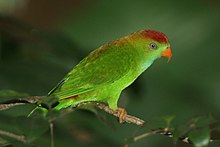Sri Lanka hanging parrot
| Sri Lanka hanging parrot | |
|---|---|

| |
| Adult in Sri Lanka | |
| Scientific classification | |
| Domain: | Eukaryota |
| Kingdom: | Animalia |
| Phylum: | Chordata |
| Class: | Aves |
| Order: | Psittaciformes |
| Family: | Psittaculidae |
| Genus: | Loriculus |
| Species: | L. beryllinus |
| Binomial name | |
| Loriculus beryllinus (Pennant, 1781) | |
The Sri Lanka hanging parrot (Loriculus beryllinus) is a small parrot which is a resident endemic breeder in Sri Lanka.
Description
The Sri Lanka hanging parrot is a small hanging parrot that is 13 cm long with a short tail. The adult has a red crown and rump. The nape and back have on orange tint. The chin and throat are pale blue. The beak is red and the irises are white.[2]
Immature birds lack the orange hue to the back, have a duller rump, and have only a hint of orange on the crown. They have a faint blue throat. They have orange beaks and brown irises.[2]
Behaviour
Sri Lanka hanging parrot is less gregarious than some of its relatives, and is usually alone or in small groups outside the breeding season. Its flight is swift and direct, and the call is a sharp whistled twiwittwit..twitwitwit. It undergoes local movements, driven mainly by the availability of the fruit, seeds, buds and blossoms that make up its diet.
Sri Lanka hanging parrot is a bird of open forest. It is strictly arboreal, never descending to the ground. It nests in holes in trees, laying 2–3 eggs.Females are involved in building the nest while males mostly remain close, observing the females.Breeding season includes the first part of the year and sometimes July-september.
In culture
In Sri Lanka, this bird is known as Gira Maliththa - ගිරාමලිත්තා or Pol Girwa - පොල් ගිරවා in Sinhala language.[3] The hanging parrot appears in a 15 cent Sri Lankan postage stamp.[4] This bird also appears on the 1000 Sri Lankan rupee bank note (2010 series).[5]
Gallery
- Sri Lanka hanging parrot at Sinharaja Forest Reserve, Sri Lanka
References
- ^ BirdLife International (2016). "Loriculus beryllinus". IUCN Red List of Threatened Species. 2016: e.T22685371A93070570. doi:10.2305/IUCN.UK.2016-3.RLTS.T22685371A93070570.en. Retrieved 12 November 2021.
- ^ a b Forshaw (2006). plate 46.
- ^ Anonymous (1998). "Vernacular Names of the Birds of the Indian Subcontinent" (PDF). Buceros. 3 (1): 53–109. Archived from the original (PDF) on 2010-04-01.
- ^ Scharning, Kjell. "Birds on stamps: Sri Lanka". www.birdtheme.org.
- ^ [1] Archived 2017-08-03 at the Wayback Machine
Cited texts
- Forshaw, Joseph M. (2006). Parrots of the World; an Identification Guide. Illustrated by Frank Knight. Princeton University Press. ISBN 0-691-09251-6.
- Birds of India by Grimmett, Inskipp and Inskipp, ISBN 0-691-04910-6


